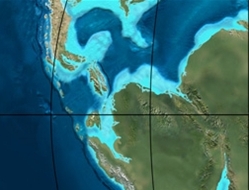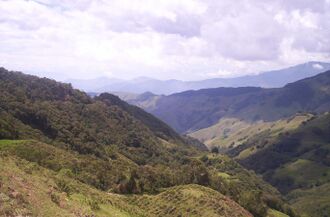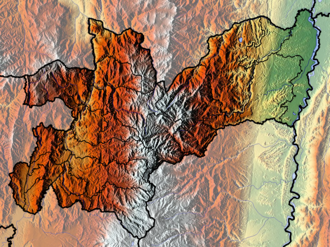Earth:Valle Alto Formation
| Valle Alto Formation Stratigraphic range: Late Jurassic ~150–145 Ma | |
|---|---|
| Type | Geological formation |
| Unit of | Quebradagrande Complex |
| Lithology | |
| Primary | Shale, sandstone |
| Other | Conglomerate |
| Location | |
| Coordinates | [ ⚑ ] : 5°22′08″N 75°22′03″W / 5.36889°N 75.3675°W |
| Region | Caldas Department Central Ranges Andes |
| Country | |
| Type section | |
| Named for | Hacienda Valle Alto |
| Named by | González et al. |
| Location | San Félix |
| Year defined | 1977 |
| Coordinates | [ ⚑ ] 5°22′08″N 75°22′03″W / 5.36889°N 75.3675°W |
| Paleocoordinates | [ ⚑ ] 3°06′N 72°24′W / 3.1°N 72.4°W |
| Region | Caldas |
| Country | |
 Paleogeography of Northern South America 150 Ma, by Ron Blakey | |
The Valle Alto Formation (Spanish: Formación Valle Alto, Jva) is a geological formation of the Central Ranges of the Colombian Andes. The formation is composed of shales, sandstones and conglomerates and dates to the Late Jurassic period. Ammonites and fossil flora have been found in the Valle Alto Formation.
Etymology
The formation was described and named in 1977 by González et al. after Hacienda Valle Alto, San Félix, Caldas.[1][2]
Lithologies
The Valle Alto Formation is composed of shales, sandstones and conglomerates.[3]
Stratigraphy, age and depositional environment
The Valle Alto Formation, part of the Quebradagrande Complex, is not defined as a proper formation, rather as a collection of rocks of different facies origin segmented by tectonic forces of the Central Ranges.[1]
The Valle Alto Formation has been deposited as the result of marine incursions from the proto-Caribbean into Colombia, preceding the larger-scale transgression of the Cretaceous.[4]
Fossil content
Fossils of Piazopteris branneri,[note 1] Cladophlebis sp., Classopollis sp., Ctenozamites sp., Desmiophyllum sp., Gleichenites sp., Nilssoniopteris sp., Otozamites sp., Pachypteris sp., Ptilophyllum sp., Rhabdoderas sp., Sagenopteris sp., Sandlingites sp., Sphenopteris sp., Substeuroceras sp., Trigonia sp., and Zamites sp. have been found in the Valle Alto Formation.[5][6]
Outcrops
The Valle Alto Formation is found near its type locality in the Central Ranges of the Colombian Andes, around Pácora and Salamina.[1]
See also
 Geology of the Eastern Hills
Geology of the Eastern Hills Geology of the Ocetá Páramo
Geology of the Ocetá Páramo Geology of the Altiplano Cundiboyacense
Geology of the Altiplano Cundiboyacense
Notes
- ↑ Piazopteris branneri listed as the Permian genus Glossopteris (branneri)[5]
References
Bibliography
- Mojica, Jairo, and Andreas Kammer. 1995. Eventos Jurásicos en Colombia. Geología Colombiana 19. 165-172. Accessed 2017-05-05.
- Mojica, Jairo. 1984. An outline on the Jurassic in Colombia. Geología Colombiana 13. 129-136. Accessed 2017-05-05.
- Moreno Sánchez, Mario; Arley de Jesús Gómez Cruz, and Luz Mary Toro. 2007. Proveniencia del material clástico del complejo Quebradagrande y su relación con los complejos estructurales adyacentes. Revista Boletín Ciencias de la Tierra 22. 27-38. Accessed 2017-05-05.
- Various, Authors. 2009. Plan de Manejo 2008 - 2012 - Parque Nacional Natural Selva de Florencia, 1-141. Isagen. Accessed 2017-05-05.
Maps
- Mosquera, Darío; Pedro Martín; Carlos Vesga, and H. González. 2009. Plancha 206 - Manizales - 1:100,000, 1. INGEOMINAS. Accessed 2017-06-06.
 |



